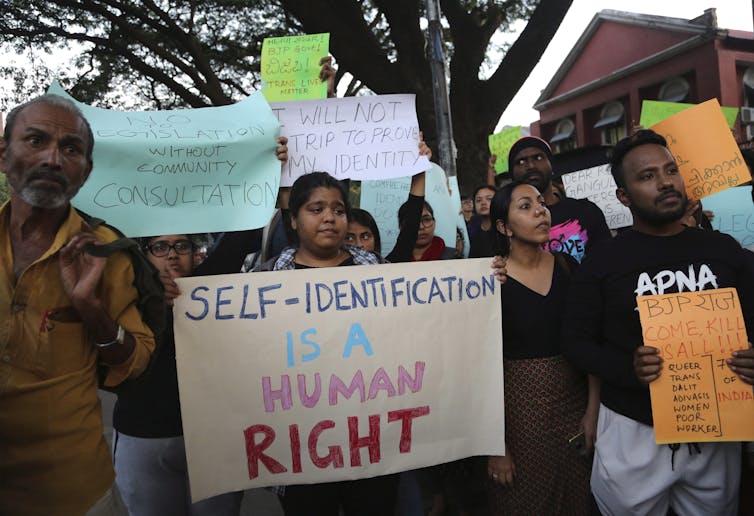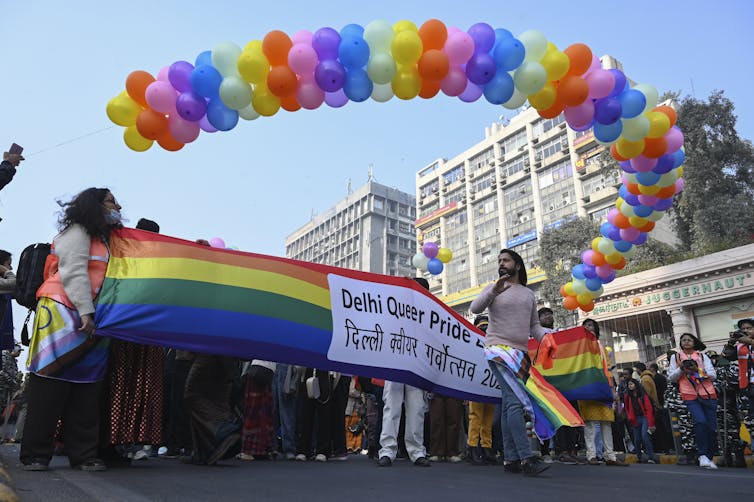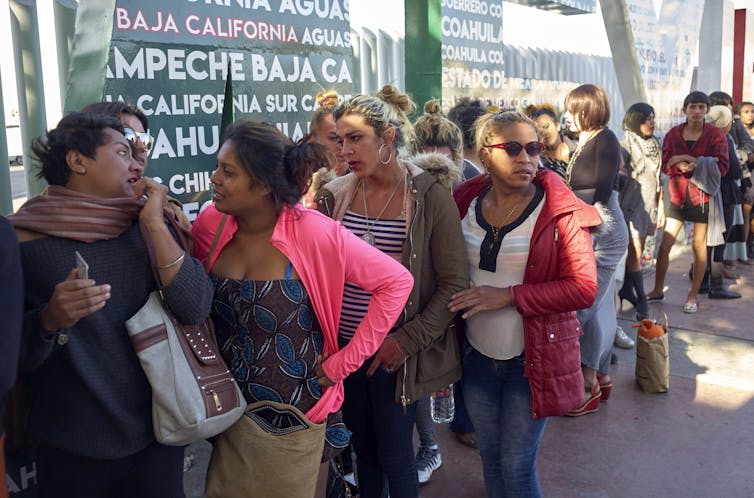

Trans and queer kinships provide emotional as well as material supports and care, but legalising marriage alone ignores such kinship ties



The Supreme Court of India recently finished hearing petitions related to marriage equality for queer and trans people. A group of 18 couples has petitioned the country’s highest court to legalise same-sex marriage.
Marriage equality would grant LGBTQ+ couples rights currently only available to those married to people of the opposite sex.
Activists are also calling for the recognition of queer and trans kinships beyond marriage. Trans and queer kinships provide emotional as well as material supports and care. But legalising marriage alone ignores such kinship ties.
Many who choose such kinships over marriage will not have access to rights and benefits that are associated with marriage.

In February, activists Rituparna Borah, Chayanika Shah, Minakshi Sanyal, Maya Sharma and six anonymised petitioners filed a petition before the Supreme Court demanding the right to form legally recognised families — even if they do not revolve around marriage.
These 10 petitioners are calling for the legal recognition of an expansive idea of family, which goes beyond the institution of marriage and is not solely defined by birth or adoption.
They are asking the court to affirm the rights of queer and trans people who have various forms of kinships, friendships and non-monogamous relationships that are not deemed legitimate in the eyes of the law.
Queer and trans people have long been getting married in India even without legal recognition. Marriage has legal and socio-cultural legitimacy that is unparalleled.
However, marriage in the Indian context enables the inequalities of the caste system to persist. Caste is a hierarchical socio-religious system which continues to privilege people of upper castes while excluding lower caste and caste-oppressed people.
Activists see marriage as a casteist institution and are demanding that the state recognise queer and trans kinships beyond marriage.
Marriage cannot contain all kinds of relationships, needs and wants that inform the lives of queer and trans people in India. Therefore, marriage equality alone cannot save or protect all trans and queer lives.
For example, social injustice and political mobilisation can inform strong relationships. Kinships rooted in affection, care, mutual support, activism and solidarity, deserve recognition, and the rights that flow from it.

Disabled and neurodivergent trans and queer people experience more discrimination when it comes to establishing relationships. Their partners are also often dissuaded or discouraged by their families from dating them.
They often choose broader networks of care, affection and support.
Recognition of different kinds of trans and queer kinships can also help dismantle relationship hierarchies. When marriage is the only valid and legal relationship, it runs the risk of marginalising those excluded from it.
Moreover, there are trans kinships which cannot be subsumed within the institution of marriage — such as Hijra households with complex kinship structures.
Older trans and queer people aging into disabilities might find it even harder to successfully advocate for themselves and their partners as they age.
Apart from marriage equality, the Indian state needs to be committed to equity to ensure the survival of trans and queer people as well as their kinship networks. Marriage equality without attention to equity cannot do justice to trans and queer lives.
If trans kinship is to be legally recognised, it should also align with demands for horizontal reservations and equality.
In India, horizontal reservations refer to policies and quotas that address historical injustices and inequities faced by marginalised groups. Such reservations would provide caste-oppressed trans people guaranteed rights with regards to education and employment which they struggle to access.
So far, Karnataka remains the only Indian state to partially provide horizontal reservations for transgender people.
Trans people often experience violence and exclusion on the basis of caste as well as transphobia. Horizontal reservations recognising caste oppression within trans communities means those who are unmarried, unpartnered and without community, can also survive when marriage equality prevails.

Kinship ties are important in the lives of variously marginalised trans people in various parts of the world. In 2018, a group of LGBTQ+ migrants, including 30 trans women, presented themselves together at the United States’ southern border, having travelled through Mexico from Honduras.
They asserted the existence of their kinship by applying for asylum in the US together. Even though they identified as a group, they were separated from each other and sent to different detention centres.
As marriage is associated with rights that cannot be obtained otherwise, it is crucial to make living and relating possible for those who want to — or have to — survive without it.
We need to advocate for the recognition of broader and inclusive forms of trans and queer kinship so that their critical support networks are not invalidated in the eyes of the law if and when marriage equality becomes a reality in India.![]()
Sohini Chatterjee, PhD Candidate & Vanier Scholar in Gender, Sexuality, and Women's Studies, Western University
This article is republished from The Conversation under a Creative Commons license. Read the original article.
We are a voice to you; you have been a support to us. Together we build journalism that is independent, credible and fearless. You can further help us by making a donation. This will mean a lot for our ability to bring you news, perspectives and analysis from the ground so that we can make change together.

Comments are moderated and will be published only after the site moderator’s approval. Please use a genuine email ID and provide your name. Selected comments may also be used in the ‘Letters’ section of the Down To Earth print edition.